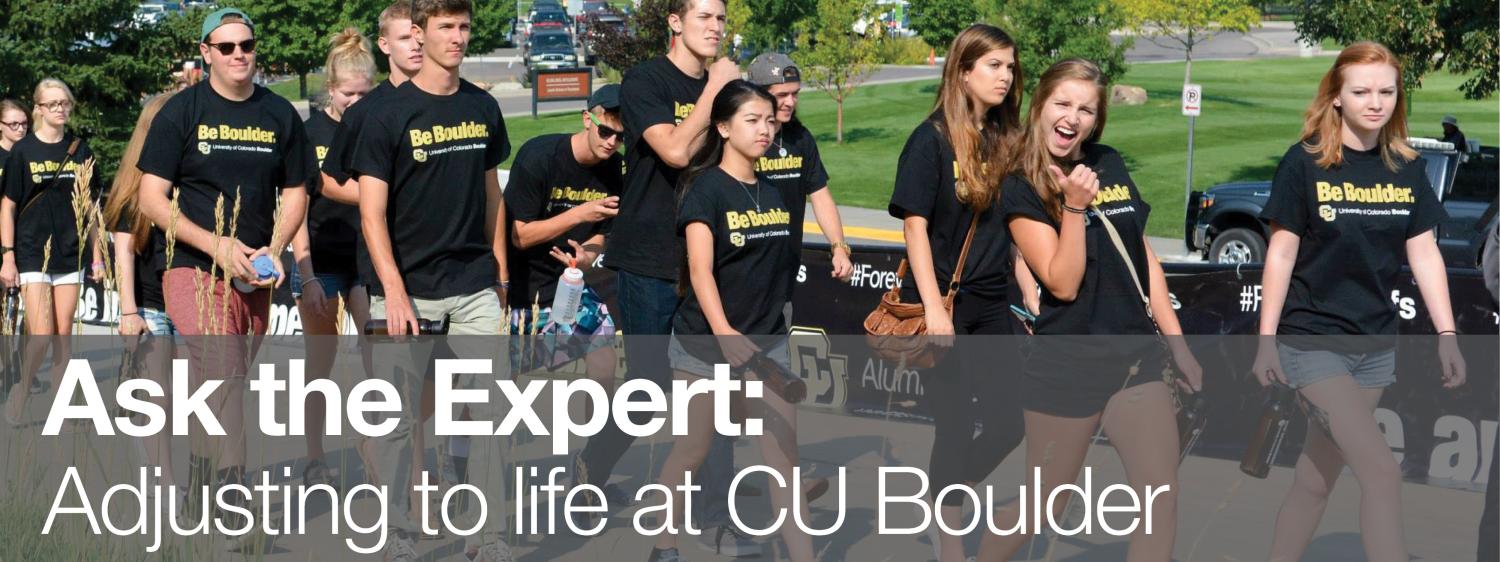Healthy Buffs: Ask the expert—Adjusting to life at CU
Adjustment is the process of adapting to new environments and challenges. It includes anything from learning to do laundry to making new friends and feeling at home in a new place. While some students may seem like they’re taking the adjustment process in stride, others may find it more difficult. No matter how it looks from the outside, though, adjustment is a process that everyone goes through.
What do we need to know about adjustment?
“Don’t give up! It’s so common to struggle with adjustment,” says Dina Matic, PhD, a clinical psychologist at Counseling and Psychiatric Services (CAPS) here at CU Boulder. “It really is about overcoming the discomfort [of adjustment] and reaching out.”
Resilience (the ability to overcome challenges and keep going) is an important piece of going through the adjustment process. Matic enjoys working with college students in particular because of their capability to grow and build resilience.
What can we do to start adjusting?
Matic recommends exploring new environments and social situations to start the adjustment process. Meeting new people, discovering new spots to relax, and spending time with friends all provide the opportunity to make connections and create a sense of “home” in a new place. Seeking out opportunities based on our interests and passions—like joining a club or intramural team—also offer the chance to meet likeminded people.
While independence can offer wonderful experiences, it is important to have checks and balances. Developing a routine by prioritizing sleep, balanced and regular meals, and staying active can all help the mind and body feel regulated as they go through times of change.
What can we do to help someone who may be struggling with the adjustment process?
“It is important to reach out to that person.” says Matic. “Inviting them to parties, maybe, but also inviting them to have coffee one-on-one because that may be what they’re comfortable with…[this can be] the bridge between them and others so that they can make those [social] connections.” Everyone has a different comfort level, and it’s important to recognize and respect that, but also to offer ways to stretch the boundaries of the comfort zone.
Again, the key is resilience. Know that every student goes through this transitional period and has the capability to come out stronger on the other side. Matic points out that struggling with adjustment is no reflection on the individual. Our propensity for resilience gets built up over time, and we develop the tools at our own pace. This process of gaining strength from challenging experiences is integral to coping with adjustment.
Adjustment is a universal process, and being able to recognize these feelings is an important step in building resilience. Reaching out, taking care of ourselves, and giving the process plenty of time and space can all help.
About the expert
Matic completed both her undergraduate and graduate training in New York. She received a BA in psychology from Barnard College and her PhD in clinical psychology from St. John’s University. Prior to joining CAPS, Matic has provided individual and group psychotherapy, crisis intervention, advocacy, teaching and consultation in a variety of educational, mental health counseling and hospital settings.
Matic really enjoys working with college students on the unique life transitions and challenges they face. She strives to create a safe and supportive environment where students can share and work on their concerns, no matter how big or small they may seem. Outside the counseling center, she enjoys music and dance.
All fee-paying CU Boulder students are eligible for up to six free sessions with a mental health professional at Counseling and Psychiatric Services. Find out more online at http://www.colorado.edu/health/counseling



